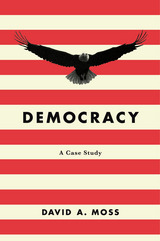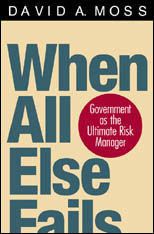
A Foreign Affairs Best Book of the Year
“This absolutely splendid book is a triumph on every level. A first-rate history of the United States, it is beautifully written, deeply researched, and filled with entertaining stories. For anyone who wants to see our democracy flourish, this is the book to read.”
—Doris Kearns Goodwin
To all who say our democracy is broken—riven by partisanship, undermined by extremism, corrupted by wealth—history offers hope. Democracy’s nineteen cases, honed in David Moss’s popular course at Harvard and taught at the Library of Congress, in state capitols, and at hundreds of high schools across the country, take us from Alexander Hamilton’s debates in the run up to the Constitutional Convention to Citizens United. Each one presents a pivotal moment in U.S. history and raises questions facing key decision makers at the time: Should the delegates support Madison’s proposal for a congressional veto over state laws? Should Lincoln resupply Fort Sumter? Should Florida lawmakers approve or reject the Equal Rights Amendment? Should corporations have a right to free speech? Moss invites us to engage in the passionate debates that are crucial to a healthy society.
“Engagingly written, well researched, rich in content and context…Moss believes that fierce political conflicts can be constructive if they are mediated by shared ideals.”
—Glenn C. Altschuler, Huffington Post
“Gives us the facts of key controversies in our history—from the adoption of the constitution to Citizens United—and invites readers to decide for themselves…A valuable resource for civic education.”
—Michael Sandel, author of Justice

Socializing Security examines the early movement for worker-security legislation in the United States. It focuses on a group of academic economists who became leading proponents of social insurance and protective labor legislation during the first decades of the twentieth century. These economists—including John R. Commons and Richard T. Ely—founded the American Association for Labor Legislation (AALL). As intellectuals and political activists, they theorized about the social efficiency of security legislation, proposed policies, and drafted model bills. They campaigned vigorously for industrial safety laws, workers’ compensation, unemployment insurance, and compulsory health insurance.
The AALL reformers were successful in some of their legislative campaigns, but failed in two of their most important ones, those for unemployment insurance and health insurance. In examining the obstacles that the reformers faced, David Moss highlights a variety of political and institutional constraints, including the constitutional doctrine of federalism and gender-biased judicial decisions.
The goal of the AALL reformers, Moss demonstrates, was not to relieve the poor, but rather to prevent workers and their families from falling into poverty as a result of accidents or illness. In favoring security over relief, economists in the progressive era defined and confirmed what has remained, for some eighty years, one of the essential values of American social policy. In concluding, Moss suggests that new policies may now be necessary in an economy in which falling wages and fewer jobs, rather than industrial hazards, are increasingly to blame for the precarious situation of the American worker.

One of the most important functions of government—risk management—is one of the least well understood. Moving beyond the most familiar public functions—spending, taxation, and regulation—When All Else Fails spotlights the government’s pivotal role as a risk manager. It reveals, as never before, the nature and extent of this governmental function, which touches almost every aspect of economic life.
In policies as diverse as limited liability, deposit insurance, Social Security, and federal disaster relief, American lawmakers have managed a wide array of private-sector risks, transforming both the government and countless private actors into insurers of last resort. Drawing on history and economic theory, David Moss investigates these risk-management policies, focusing in particular on the original logic of their enactment. The nation’s lawmakers, he finds, have long believed that pervasive imperfections in private markets for risk necessitate a substantial government role. It remains puzzling, though, why such a large number of the resulting policies have proven so popular in a country famous for its anti-statism. Moss suggests that the answer may lie in the nature of the policies themselves, since publicly mandated risk shifting often requires little in the way of invasive bureaucracy. Well suited to a society suspicious of government activism, public risk management has emerged as a critical form of government intervention in the United States.
READERS
Browse our collection.
PUBLISHERS
See BiblioVault's publisher services.
STUDENT SERVICES
Files for college accessibility offices.
UChicago Accessibility Resources
home | accessibility | search | about | contact us
BiblioVault ® 2001 - 2024
The University of Chicago Press









